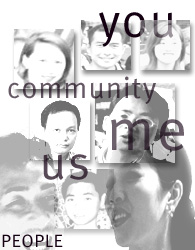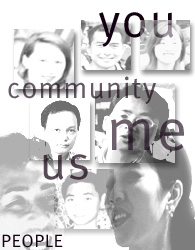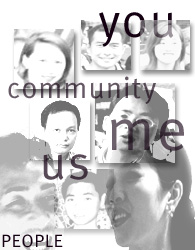Lim Chi-Sharn is a Master of Science student in Geotechnical Engineering at the University of California, Berkeley. The openly gay 22-year-old is studying under a prestigious Public Service Commission (PSC) Overseas Merit Scholarship awarded by the Singapore government and will serve a bond with the Singapore Civil Service upon graduation.

On being gay and out
æ: Being a gay and out student at UC Berkeley on a (Singapore) government scholarship, what are the challenges you are facing?
sharn: I first came out to other people (as opposed to coming out to myself - i.e. self acceptance) when I was 16, I think, and came out to my family 2 years after. I didn't really make many connections with the larger PLU* [GLBT] community in Singapore in my teenage years--that's a separate challenge in itself.
The challenge when I first came here was coming out again to new friends. Especially interesting was coming out to my floormates since I lived in a campus dormitory. I came out to them while I was peeling a pomelo and someone said something about my "bitches" etc. etc. so instead of railing about why we shouldn't use derogatory terms for women, I said, "oh, I'm gay actually."
Stunned silence. (I was holding a knife.)
"Who wants pomelo?" I carried on.
The next challenge was finding out how I fit into the queer community in my school, in California. (Finding my place in this part of the world, so to speak.) Singapore and California are two very different places. (Both arguably pretty gay-friendly in many respects, and both arguably gay-unfriendly in many respects.) Guess you could say it took time and energy before I found a place within queer society that was comfortable to me, and I found a circle of good friends, Singaporean and non-Singaporean, queer and not queer.
I went to social groups, I went to clubs, I hung out with friends and friends of friendsģ I thought to myself that if I wanted to make connections to the people, esp. the queer community, here, I should just try to be out there. I know some people might shy away from social-support groups due to misplaced stigma, but I've met many sane and cute friends through groups!
It's a matter of numbers if you want to meet non-straight friendsŚI mean, you can't always just make friends on the street by relying on your gaydarŚand you can't always make friends at clubs or other places. You can't always make friends online. So why not try out all these avenues available to you?
When the Singapore Armed Forces (SAF) first asked me, I told the good doctor I wasn't gay. That was pretty true, because I really wasn't 100% sure myself. I came out to friends earlier because of my need for emotional support from them for the state of questioning I was sort of in. people and organisations (like the SAF and the civil service for example) always want to know whether you are something, or whether you're not something.
How do you explain that you're not sure? So I said I wasn't gay because that's the mainstream thing to do. Besides, if you're gunning for a government scholarship, and you know that there's a law like section 377(a) on the books, what would you do?
In any case, my PSC superiors know I'm gay, because I've told one or two of them by way of conversation. Dinner table conversation.
I'll open the next Pandora's box later, you know, being gay and "Asian" in the US.
æ: Why did you choose to be out knowing the possible implications?

The 'next level' is the fact (yes, fact, damn it) that humans should not be ashamed of being human. Same-sex attraction and relations are part of the human experience and I refuse to be ashamed of myself.
Damn the consequences, eh? No lah. I'm a risk-averse person and I the risk I accept is calculated.
æ: What are the reactions from family and friends when they learn that you are out, especially when it seems to many like being gay and out would spell the end your career that has even barely begun?
First of all, there's more to life than having a successful career. Really!!
No, this does not mean that my career has ended. While I fully intend to work in the civil service and practice as an engineer, I'll go where I'm wanted. Youthful arrogance, eh? The fear of those around me is rational: Singapore law does not have well-developed anti-discrimination laws like the EU or the USA.
Marginalised groups may suffer as a result, especially in bad times like recessions. That being said, I think Singapore society seems to be moving slowly towards more rational treatment of non-straight citizens, friends, and family members. Anyone who yammers about Asian society cannot accept this perversion blah blah can look to the pastŚhistorical evidence of same-sex relations as part of society can easily be foundŚand the presentŚjust look at our east Asian neighbours like Taiwan, and Japan (esp. Tokyo.)
And then of course there's the flip side: our esteemed northern neighbour.
In Secondary 4, I told some of my judo team members. Nothing bad came of it, no backlash or anything, but some guys didn't believe me then, so I had to come out to them again. Weird, huh?
Being gay in US ad Singapore
æ: Do you feel like a marginalised gay Asian man (something we hear every so often) in the US?
I guess if I walked around the Castro district of San Francisco (also the gay capital of north America, in my opinion) I would see more White people than people of Color but that's a matter of numbers. One might feel marginalised I suppose but if you stepped into some of the clubs that have a large queer Asian-Pacific-Islander clientele, you would feel different.
I don't feel marginalised maybe because I didn't grow up here and I haven't lived that long here in California but there are so many east Asians and southeast Asians here in northern California, it's hard for me to feel marginalised anyway. I can speak mandarin (somewhat) and understand a little Cantonese so that may help me be closer to the Chinese-speaking (gay) community here. I find that if I just dwell in the English-speaking queer community here, I don't feel as comfortable, or as balanced in my existence.
Now, that's not to say that there's no problem of marginalisation of minorities including gay Asian men. There IS a problem. That's why organisations like the Asian Pacific Islander Wellness Center or the Gay Asian Pacific Alliance exist, that's why social groups existŚto build community, to ensure that attention is being paid and tax dollars equitably used to address the issues specific to the lives of people of color.
You could consider the development of Sinda, Mendaki etc. in Singapore as organisations formed to ensure that everyone gets the assistance he/she needs in a similar way.
æ: After spending 3 years in the San Francisco bay area, you said that you would be happy to return and live in Singapore. Do you agree with those who say that Singapore is conservative, oppressive and draconian?

I don't think the Singapore government can be described as oppressive and draconian in recent years. I would say that there's a lack of transparency in some areas of policy: for example, the Singapore government tends not to spell out exactly what is or is not permitted in 'sensitive areas' (e.g. a play dealing with racism) and instead prefers to have us feel out what is taboo. If it is, something gets banned or censored. You have little way of telling beforehand at any one time exactly what is taboo or not. That's kind of heavy-handed and opaque-governance if you ask me.
Earlier this year, I sat in the audience of a panel, which included the chairman of the board of censors. The first time I met the guy! I never elected him (though the government which appointed him was elected by the people of Singapore) yet he gets to control what I watch or cannot watch? Am I still a kid?
On Singapore's anti-sodomy law
æ: Do you think that Singapore will change its position on homosexuality and even repeal Section 377(A) that prohibits sex between two men in the next 10 years?
The Singapore government has slowly but perceptibly changed its position on PLU people over the years. There's more to be done, of course, and I think things will continue to change for the better so long as we as a community continue to work for change. But, I strongly doubt that PLU* will become a registered society yet. We'll see.
Rest assured that PLU*, Signel*, sgboy.com and (most likely) fridae.com are being monitored by our good government and perhaps more understanding will occur. We're all Singaporeans, you know, every Singaporean counts, right?
As for that law, it really should go. It really is an historical relic. If enforced, or even if it's still on the law books, it's a source of oppression onto fellow human beings. Simply unconscionable in my mind.
Community involvement
æ: Are you involved or have you ever been involved with any gay and lesbian activist/support groups? If so, which? How and why did you get started?
I started out as members of various groups around UC Berkeley. I guess I would have joined groups for queer and questioning teens in Singapore if they existed! I observed how the facilitators of these various groups did their job and I thought: " I could do this." last year I became a co-facilitator of UC Berkeley's only queer and Asian-Pacific-Islander focused group Cal Q&A and I did that for one year until I graduated.
I realised how important it is for these groups to exist to help people make friends, or as a platform for their thoughts, or as a nexus for organisingŚe.g. fundraising. This is especially important for young people who may not have friends to talk to in their already established circle of friends who might not know that their friend is gay, or who may not understand what their friend is going thru.
æ: What do you think we need most in Asia's gay and lesbian community?
This is a real toughie. I think we need more organising and more community building. However, it is important to prevent the false dichotomy of Us vs Them because we're all human beings. Don't ask me how to achieve that, I don't know.
æ: In the context of being an Asian gay or lesbian, do you have any personal role models/inspirations?
My cats Mac and Zoe, also my mom and god mom. I learned how to have a steel will and be emotionally strong.
æ: What advice would you give to someone who is gay but feel like he or she can't come out because of fear of being marginalized/oppressed by society?
Step one: be comfortable with who you are.
Then, don't come out if your life/livelihood depends on it. Form community, make trusted friends, and form a strong emotional base such that you can weather the consequences of coming out. Hope for the best, but prepare for the worst. Shit happens, sometimes.
On the flip side, don't shyshy. Come out and play!
æ: Have you ever encountered prejudice because of your gender/sexuality? How did you deal with it?
once when I was not out, one of friends said something about how all faggots should die etc. etc. I basically told him he'd regret he ever said that because one of his friends just might turn out to be gay. Then I "cursed" him by saying that one of his sons is gonna grow up gay.
æ: Do you believe in monogamous or open relationships? Are you in one?
I think both can work, and, for me, it would depend on the person/people involved. I think all relationships are evolving emotional contracts and each contract is different with different people.
Or maybe I'm just a slut.
Am I in one? hmmmmm... what would you like my answer to be... ?
æ: If you could ask any one person in this world to dinner, who will it be and what do you think you will talk about?
Aprķs Interview
æ: What's the stupidest pick-up line you've ever heard?
"Are you Chinese, because you're all that and dimsum (then some.)"
Not actually said to me, but contributed by good friend of mine.
æ: Towel or tissue?
Hand.
* PLU is used loosely as a proud Sinagpore term for 'gay' when a small group of friends informally formed People Like Us in 1993. People Like Us was the name of the proposed gay organisation to be set up by ten Singaporeans, who applied to the Registrar of Societies in 1996 to have this group recognised. Their application was turned down and has been unsuccessful ever since. Signel is Singapore Gay News List: the email forum for gay, lesbian, bisexual, transsexual and transgender Singaporeans and Singapore residents.
